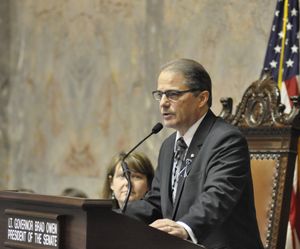Owen, Habib trade letters, jabs over lt. gov. race
OLYMPIA – Day 2 of the War of Words between Lt. Gov. Brad Owen and Sen. Cyrus Habib, who wants to replace him.
After Owen sent a critical letter to Habib that was reported by the news media Wednesday, Habib responded with a letter of his own Thursday. We're posting the two letters so that interested parties can compare, contrast and decide for themselves.
Here's the original Spin Control post, for those who want to start from the beginning:
Lt. Gov. Brad Owen has criticized one of his possible replacements, saying his fellow Democrat may be too partisan for the job and doesn’t understand some of its duties.
“I am disappointed that you have crossed the line and have made meaningless and ‘Donald Trump’-type proposals to get elected to office,” Owen wrote in a letter Tuesday to Sen. Cyrus Habib of Bellevue. “I call upon you to tone down your rhetoric and dismiss these proposals of yours which demeans the office of lieutenant governor and will create chaos in the Washington State Senate.”
But Habib shot back that he understands the rules of procedure as an attorney who teaches legislative law and wants to turn the position into a more active job. Owen, a 20-year veteran of the position, is reacting badly to someone who wants to do things differently, Habib contended.
As an American of Middle Eastern descent, “I did not expect to be called Donald Trump,” Habib said, adding he believes the letter is “full of inaccuracies.”
Owen took issue with Habib saying he would not sign a budget that passed the Senate that he feels does not meet the state’s constitutional obligations to public education under the state Supreme Court’s McCleary decision. Owen called that stance He calls it “unconstitutional and irresponsible,” adding: “If you wish to veto legislation, perhaps you should run for governor.”
Habib countered that he realizes that signing bills is a ministerial function, not a veto power. But he said the Legislature is being sanctioned for failing to comply with parts of the McCleary decision and if elected he would speak out for constitutional compliance.
“If I felt strongly what was being done was unconstitutional, I would refer it to the president pro tem to sign,” he said. “I don’t view getting out of a contempt order as partisan.” The president pro tem, who is usually chosen by the majority party in the Senate, stands in for the lieutenant governor in his or her absence.
Owen also said Habib is suggesting he won’t need the two Senate caucus attorneys who give advice on complicated questions involving previous rulings, case law, parliamentary procedure and the Constitution.
“Despite your obvious high opinion of your lawyering skills, these advisers are invaluable assets to the job and again ensure the ability of the presiding officer to be thoughtful and fair,” Owen said.
Habib, a member of a large law firm who also teaches at University of Washington Law School, said he isn’t proposing to ignore caucus attorneys but is trying to convince voters it would be an advantage to have someone who knows the law and can “use those tools to help people.”
Owen announced earlier this year he was retiring after five terms in the office and a total of 40 years in elective office. Habib is one of four Democrats in a field of 11 running to replace him.

